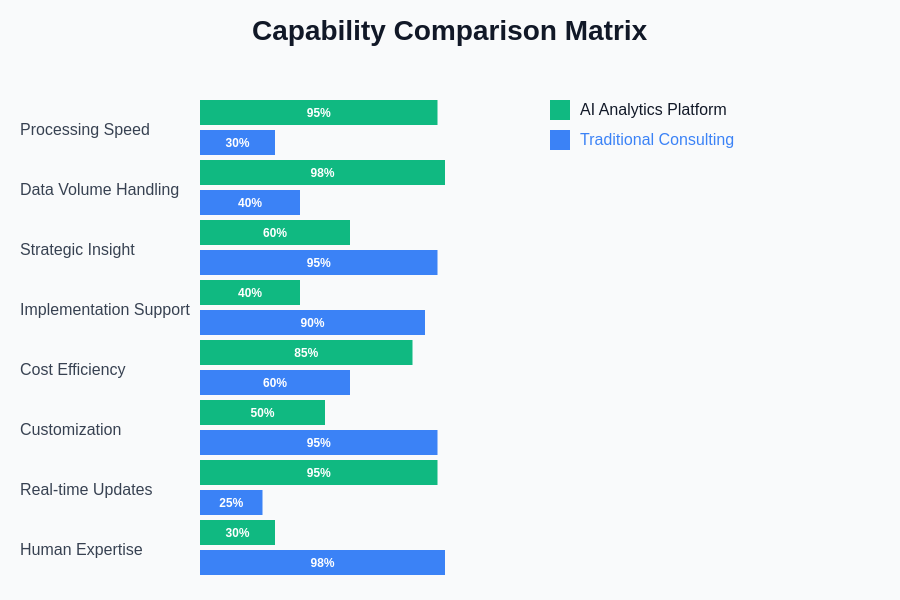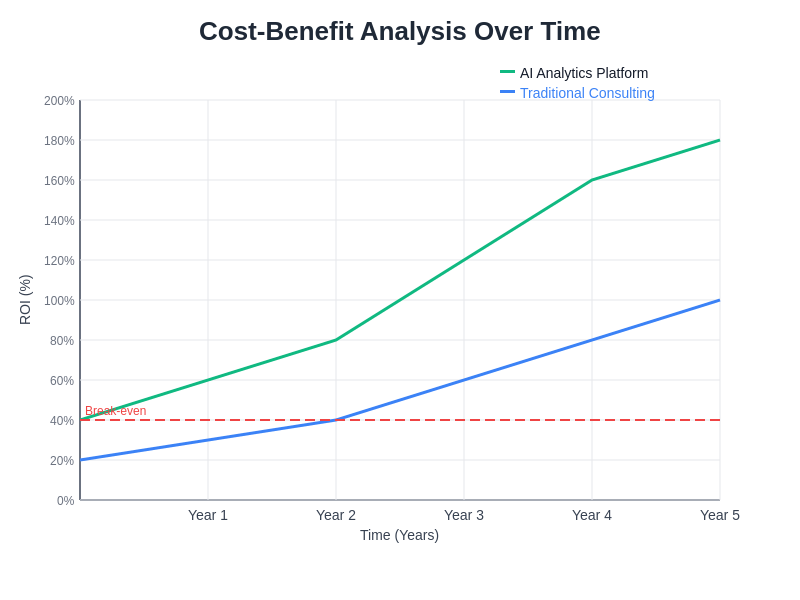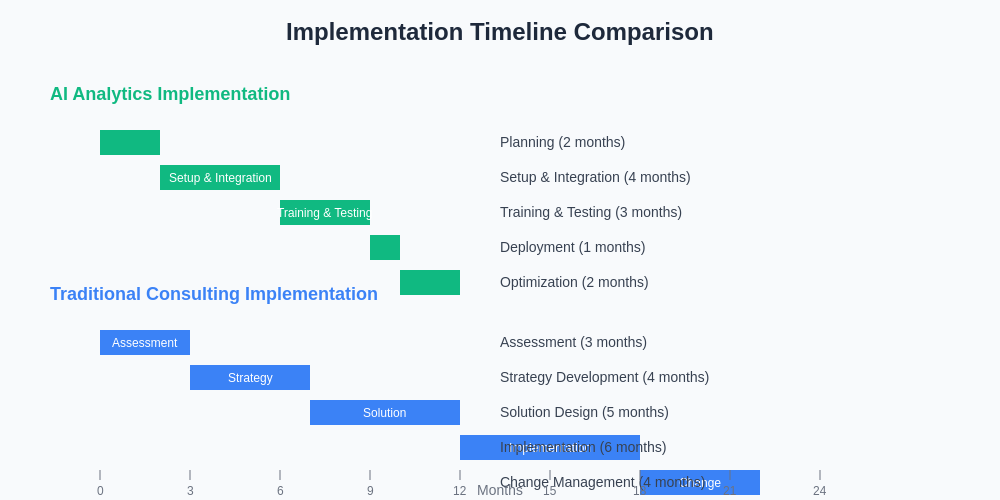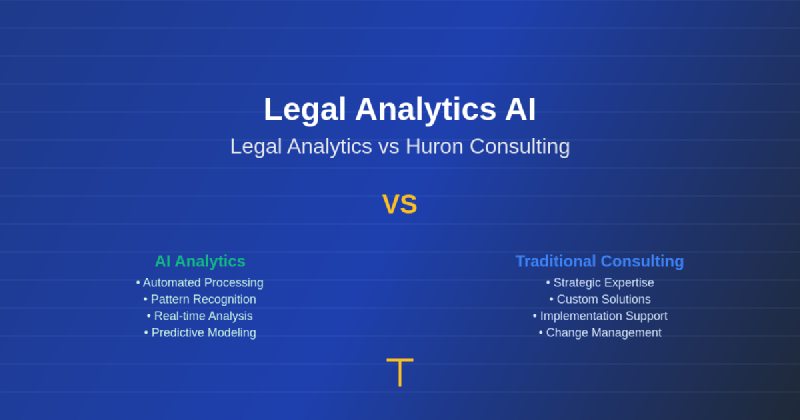The legal industry stands at the precipice of a technological revolution, where artificial intelligence and advanced analytics are fundamentally transforming how legal professionals approach data analysis, case strategy, and business decision-making. The emergence of sophisticated Legal Analytics AI platforms has created new paradigms for understanding legal trends, predicting case outcomes, and optimizing legal operations, challenging traditional consulting methodologies and establishing new benchmarks for analytical excellence in the legal sector.
Explore cutting-edge AI developments in legal technology to understand how emerging technologies are reshaping the fundamental practices of legal analysis and consultation. The intersection of artificial intelligence and legal analytics represents one of the most significant disruptions in the legal industry, offering unprecedented insights into legal patterns, judicial behaviors, and strategic opportunities that were previously impossible to identify through conventional analytical approaches.
The Evolution of Legal Analytics
Legal analytics has undergone a remarkable transformation from traditional manual research and basic statistical analysis to sophisticated artificial intelligence-powered platforms capable of processing vast amounts of legal data with unprecedented accuracy and speed. This evolution has been driven by the exponential growth of digital legal documents, court records, and regulatory filings, creating an environment where traditional analytical approaches are no longer sufficient to extract meaningful insights from the overwhelming volume of available legal information.
The traditional approach to legal analytics, exemplified by consulting firms like Huron Consulting, relied heavily on manual data collection, expert analysis, and statistical modeling techniques that, while effective, were inherently limited by human processing capabilities and time constraints. These methods typically involved extensive manual review of legal documents, preparation of statistical reports, and strategic recommendations based on historical patterns and expert judgment, processes that could take weeks or months to complete and were susceptible to human error and analytical bias.
Modern Legal Analytics AI platforms have revolutionized this landscape by introducing machine learning algorithms, natural language processing capabilities, and predictive modeling techniques that can analyze millions of legal documents in minutes, identify complex patterns that escape human detection, and provide real-time insights that enable more informed decision-making. These platforms represent a fundamental shift from reactive analysis to proactive intelligence, transforming legal analytics from a retrospective exercise into a forward-looking strategic advantage.
Legal Analytics AI: Technological Capabilities
Contemporary Legal Analytics AI platforms leverage sophisticated artificial intelligence technologies to deliver comprehensive analytical capabilities that far exceed the scope and accuracy of traditional consulting approaches. These platforms utilize advanced natural language processing to understand legal terminology, context, and nuanced meanings within legal documents, enabling them to extract relevant information with remarkable precision and consistency across diverse legal contexts and jurisdictions.
Machine learning algorithms within these platforms continuously improve their analytical capabilities by learning from vast datasets of legal outcomes, judicial decisions, and case precedents, creating increasingly accurate predictive models that can forecast case outcomes, identify litigation risks, and suggest optimal strategic approaches. The integration of deep learning technologies enables these platforms to recognize complex patterns within legal data that would be virtually impossible for human analysts to identify, providing insights that can fundamentally alter legal strategies and business decisions.
Experience advanced AI capabilities with Claude for comprehensive legal research and analysis tasks that require sophisticated reasoning and contextual understanding. The convergence of artificial intelligence and legal expertise creates powerful analytical tools that augment human legal professionals rather than replacing them, enabling more informed decision-making and strategic planning across all aspects of legal practice.
The real-time processing capabilities of Legal Analytics AI platforms enable immediate analysis of new legal developments, regulatory changes, and judicial decisions, providing legal professionals with up-to-the-minute insights that can influence ongoing cases and strategic planning. This immediacy represents a significant advantage over traditional consulting approaches that typically require extended timeframes for comprehensive analysis and reporting.
Huron Consulting: Traditional Excellence
Huron Consulting represents the pinnacle of traditional legal consulting excellence, bringing decades of experience, deep industry expertise, and proven methodologies to legal analytics challenges. The firm’s approach emphasizes human expertise, strategic thinking, and customized solutions that are tailored to specific client needs and industry contexts, providing a level of personalized service and strategic insight that has established them as a trusted partner for major law firms and corporate legal departments.
The Huron Consulting methodology relies on experienced consultants who possess extensive knowledge of legal industry trends, regulatory requirements, and best practices, enabling them to provide strategic guidance that goes beyond pure data analysis to include implementation planning, change management, and organizational development. This holistic approach recognizes that effective legal analytics requires not only accurate data analysis but also strategic thinking about how insights can be translated into actionable business improvements.
Huron’s expertise in legal operations, financial management, and organizational effectiveness provides a comprehensive foundation for understanding how analytical insights can be integrated into broader business strategies and operational improvements. Their consultants work closely with clients to understand unique challenges, organizational cultures, and strategic objectives, ensuring that analytical recommendations are practical, achievable, and aligned with overall business goals.
The firm’s track record of successful engagements across diverse legal environments demonstrates the value of human expertise in interpreting complex analytical findings and developing customized solutions that address specific organizational needs. This experience-based approach provides a level of strategic context and practical wisdom that purely technology-driven solutions may lack, particularly in complex organizational transformation initiatives.
Comparative Analysis: Speed and Efficiency
The comparison between Legal Analytics AI platforms and traditional consulting approaches reveals significant differences in processing speed, analytical capacity, and operational efficiency that have profound implications for legal decision-making and strategic planning. Legal Analytics AI platforms can process vast amounts of legal data in minutes or hours, analyzing millions of documents, court records, and legal precedents to identify patterns, trends, and insights that would require weeks or months using traditional analytical methods.
This speed advantage extends beyond simple data processing to include real-time monitoring of legal developments, automated alerts for relevant case law changes, and immediate analysis of new judicial decisions that can impact ongoing legal strategies. The ability to provide instant analytical responses to complex legal questions represents a fundamental shift in how legal professionals can approach time-sensitive decisions and rapidly evolving legal situations.
Traditional consulting approaches, while slower in terms of raw processing speed, offer advantages in terms of strategic thinking, contextual analysis, and customized solution development that require human judgment and experience. Huron Consulting’s methodical approach ensures thorough consideration of all relevant factors, stakeholder perspectives, and implementation challenges that may not be immediately apparent through automated analysis alone.
The efficiency comparison reveals complementary strengths where AI platforms excel at rapid data processing and pattern recognition, while traditional consulting approaches provide superior strategic thinking, implementation planning, and organizational change management capabilities. The optimal approach often involves leveraging both methodologies to maximize analytical accuracy and strategic effectiveness.

The comprehensive capability analysis demonstrates distinct advantages for each approach across different performance dimensions, highlighting the complementary nature of AI-powered analytics and traditional consulting methodologies in addressing diverse legal analytics requirements.
Accuracy and Analytical Depth
Legal Analytics AI platforms demonstrate remarkable accuracy in data processing, pattern recognition, and trend identification, leveraging machine learning algorithms that continuously improve their analytical capabilities through exposure to vast datasets of legal information. These platforms can identify subtle patterns within legal data that might escape human detection, providing insights into judicial behaviors, case outcome predictors, and strategic opportunities that enhance legal decision-making accuracy.
The analytical depth provided by AI platforms includes sophisticated statistical modeling, predictive analytics, and correlation analysis that can reveal complex relationships between multiple variables affecting legal outcomes. These capabilities enable legal professionals to make more informed decisions based on comprehensive data analysis rather than relying solely on intuition and limited historical experience.
However, traditional consulting approaches offer analytical depth that incorporates strategic thinking, industry knowledge, and contextual understanding that pure data analysis cannot provide. Huron Consulting’s experienced consultants bring years of practical experience in legal operations, regulatory compliance, and organizational dynamics that enable them to interpret analytical findings within broader business contexts and strategic frameworks.
Leverage comprehensive research capabilities with Perplexity to enhance legal research and analysis with advanced information gathering and synthesis capabilities. The integration of multiple analytical approaches creates a more comprehensive understanding of complex legal challenges and strategic opportunities.
The accuracy comparison reveals that while AI platforms excel at data processing accuracy and pattern recognition, traditional consulting approaches provide accuracy in strategic interpretation, implementation planning, and organizational impact assessment that requires human expertise and judgment.
Cost-Effectiveness and Resource Allocation
The economic implications of choosing between Legal Analytics AI platforms and traditional consulting approaches involve complex considerations of initial investment, ongoing operational costs, scalability requirements, and long-term value creation that vary significantly based on organizational size, analytical needs, and strategic objectives. Legal Analytics AI platforms typically require substantial upfront investment in software licensing, implementation, and training, but offer significant long-term cost advantages through automated processing, reduced manual labor requirements, and scalable analytical capabilities.
Traditional consulting approaches involve different cost structures that emphasize human expertise, customized analysis, and strategic guidance, typically resulting in higher per-project costs but potentially greater strategic value for complex organizational transformation initiatives. Huron Consulting’s approach provides access to specialized expertise that may not be available internally, offering cost-effective solutions for organizations that require periodic strategic guidance rather than ongoing analytical capabilities.
The scalability comparison reveals significant advantages for AI platforms that can process increasing volumes of data without proportional increases in operational costs, while traditional consulting approaches may require additional resources as analytical requirements expand. This scalability factor becomes particularly important for large law firms and corporate legal departments that need to analyze vast amounts of legal data on an ongoing basis.
Resource allocation considerations include not only direct costs but also internal resource requirements for implementation, training, and ongoing management that can significantly impact the total cost of ownership for both approaches. Organizations must carefully evaluate their specific needs, capabilities, and strategic objectives to determine the most cost-effective analytical approach.

The long-term financial implications reveal significant differences in investment patterns and return trajectories, with AI platforms requiring substantial upfront investment but delivering accelerating returns, while traditional consulting approaches offer more predictable but gradual value creation over time.
Implementation and Integration Challenges
The successful implementation of Legal Analytics AI platforms requires careful consideration of technical infrastructure requirements, data integration challenges, and organizational change management that can significantly impact the success of analytical initiatives. These platforms typically require robust technical infrastructure, data standardization, and integration with existing legal systems that may require substantial upfront investment and technical expertise.
Organizations implementing Legal Analytics AI platforms must address data quality issues, system compatibility requirements, and user training needs that can affect the accuracy and adoption of analytical capabilities. The complexity of legal data, varying formats of legal documents, and diverse analytical requirements across different practice areas create implementation challenges that require careful planning and execution.
Traditional consulting approaches like those provided by Huron Consulting offer different implementation advantages through experienced project management, change management expertise, and customized solution development that can address specific organizational challenges and requirements. Their implementation methodology emphasizes stakeholder engagement, organizational readiness assessment, and phased implementation strategies that minimize disruption while maximizing analytical value.
The integration comparison reveals that AI platforms offer superior technical integration capabilities with existing systems, while traditional consulting approaches provide superior organizational integration through change management, training, and strategic alignment initiatives. The optimal implementation strategy often requires combining both technical and organizational integration approaches to maximize success.

The implementation timeline analysis reveals fundamental differences in project duration and phase distribution, with AI platforms offering faster deployment but requiring intensive upfront technical work, while traditional consulting approaches involve longer but more comprehensive organizational transformation processes.
Strategic Decision-Making and Business Impact
The impact of analytical approaches on strategic decision-making reveals fundamental differences between data-driven insights provided by Legal Analytics AI platforms and strategic guidance offered by traditional consulting approaches. AI platforms excel at providing comprehensive data analysis, predictive modeling, and trend identification that can inform strategic decisions with unprecedented accuracy and depth of insight.
Legal Analytics AI platforms enable strategic decision-making based on comprehensive analysis of historical patterns, predictive modeling of future trends, and real-time monitoring of relevant legal developments that can significantly enhance the quality and timing of strategic decisions. These capabilities are particularly valuable for litigation strategy, risk assessment, and business planning where data-driven insights can provide competitive advantages.
Traditional consulting approaches provide strategic decision-making support through experienced analysis, industry expertise, and customized strategic guidance that incorporates broader business considerations beyond pure data analysis. Huron Consulting’s strategic approach recognizes that effective legal decision-making requires consideration of organizational capabilities, market conditions, and competitive dynamics that may not be reflected in historical data alone.
The business impact comparison demonstrates that while AI platforms can provide superior analytical insights, traditional consulting approaches often deliver greater strategic value through implementation support, organizational alignment, and change management capabilities that ensure analytical insights are effectively translated into business improvements.
Future Trends and Industry Evolution
The future evolution of legal analytics will likely involve increasing integration of artificial intelligence capabilities with traditional consulting expertise, creating hybrid approaches that leverage the strengths of both methodologies while addressing their respective limitations. This convergence represents the next phase of legal analytics evolution where technology augments human expertise rather than replacing it entirely.
Emerging technologies such as advanced natural language processing, predictive analytics, and automated reasoning will continue to enhance the capabilities of Legal Analytics AI platforms, enabling more sophisticated analysis of complex legal issues and strategic challenges. These technological advances will expand the scope of automated analysis while maintaining the need for human expertise in strategic interpretation and implementation planning.
The legal consulting industry will likely adapt by incorporating AI capabilities into their service offerings while maintaining focus on strategic thinking, implementation support, and organizational development that require human expertise. This evolution will create new service models that combine technological capabilities with human expertise to deliver comprehensive analytical solutions.
The industry trend toward increased data availability, regulatory transparency, and digital transformation will continue to expand opportunities for both AI platforms and consulting approaches, creating a larger market for legal analytics services while increasing competition and innovation in analytical methodologies and service delivery models.
Conclusion and Strategic Recommendations
The comparison between Legal Analytics AI platforms and traditional consulting approaches reveals complementary strengths that suggest optimal legal analytics strategies may involve leveraging both methodologies rather than choosing one approach exclusively. Organizations should carefully evaluate their specific analytical needs, organizational capabilities, and strategic objectives to determine the most effective combination of technological and human expertise.
Legal Analytics AI platforms offer superior capabilities for data processing, pattern recognition, and real-time analysis that can significantly enhance legal decision-making accuracy and efficiency. These platforms are particularly valuable for organizations with substantial analytical requirements, technical capabilities, and ongoing needs for comprehensive legal data analysis.
Traditional consulting approaches like those provided by Huron Consulting offer superior strategic thinking, implementation support, and organizational development capabilities that are essential for translating analytical insights into business improvements. These approaches are particularly valuable for complex organizational transformation initiatives, strategic planning, and implementation of analytical capabilities.
The optimal strategic approach involves recognizing that legal analytics excellence requires both sophisticated technological capabilities and experienced human expertise, suggesting that the future of legal analytics lies in intelligent integration of AI platforms with traditional consulting approaches rather than viewing them as competing alternatives.
Disclaimer
This article is for informational purposes only and does not constitute professional legal or business advice. The views expressed are based on current understanding of legal analytics technologies and consulting methodologies. Readers should conduct their own research and consult with qualified professionals when making decisions about legal analytics solutions. The effectiveness of different analytical approaches may vary depending on specific organizational needs, technical capabilities, and strategic objectives.
